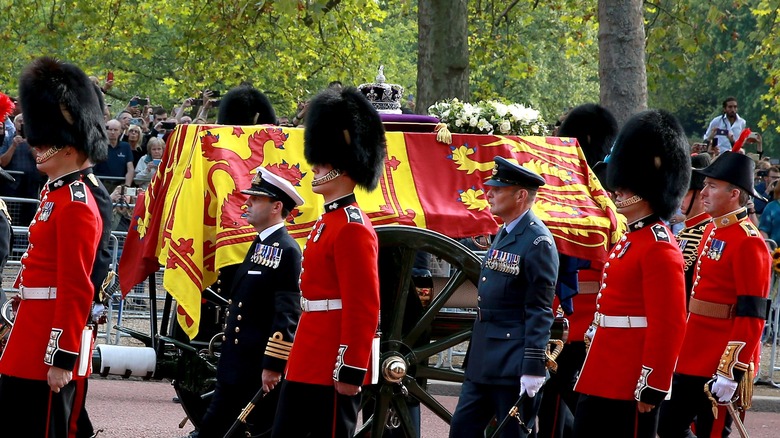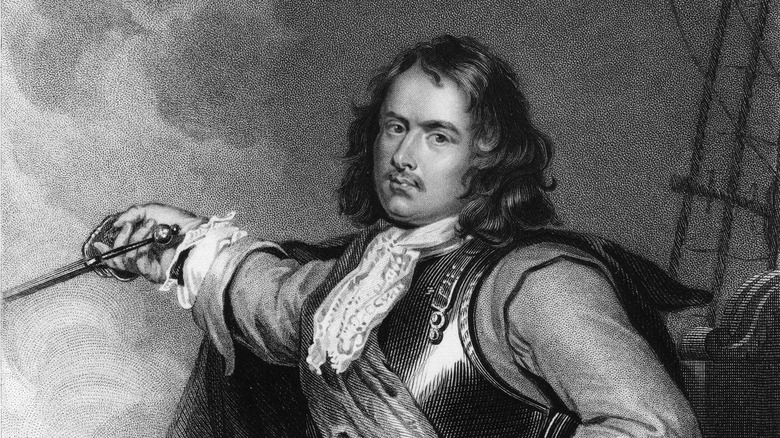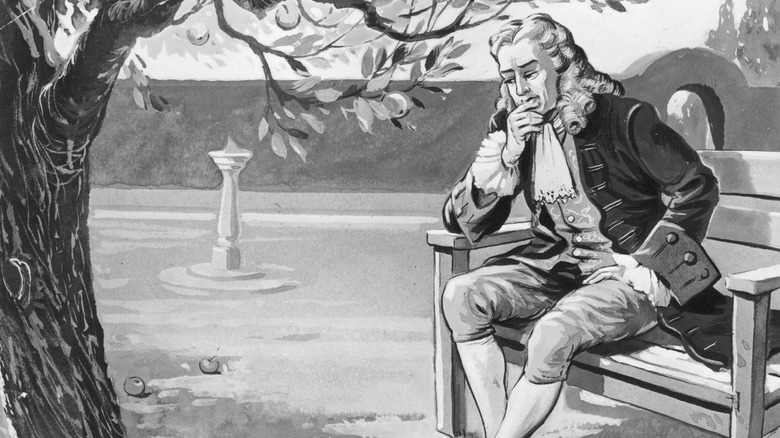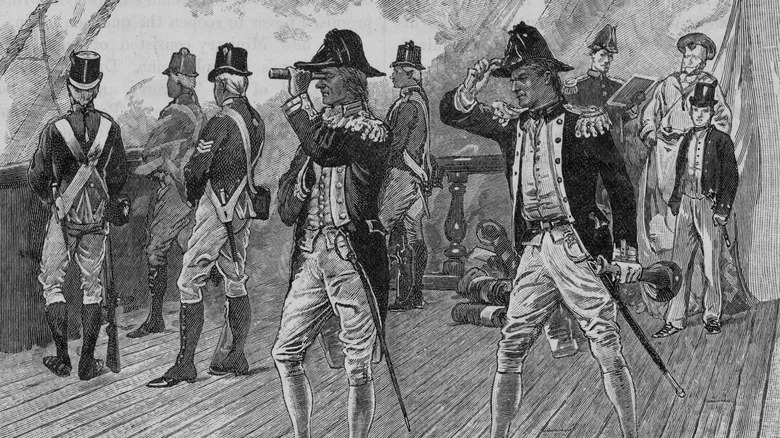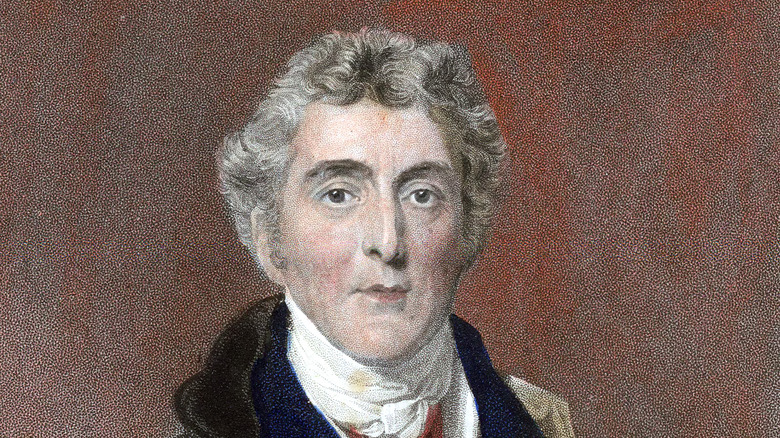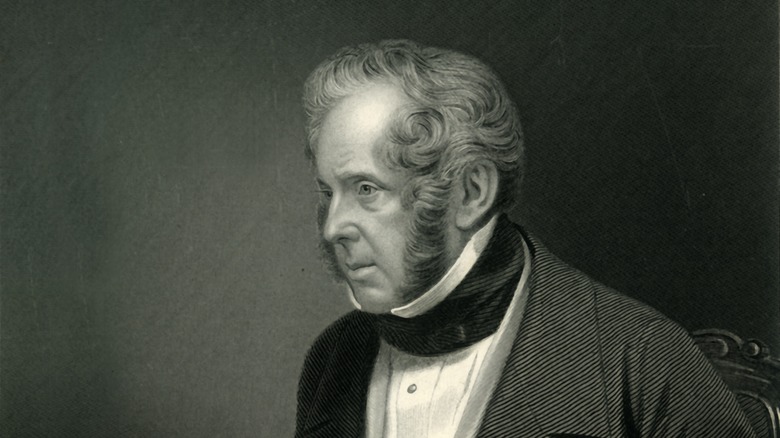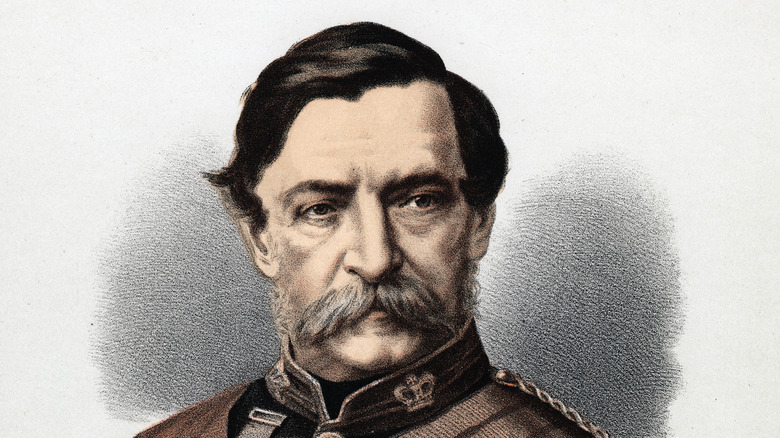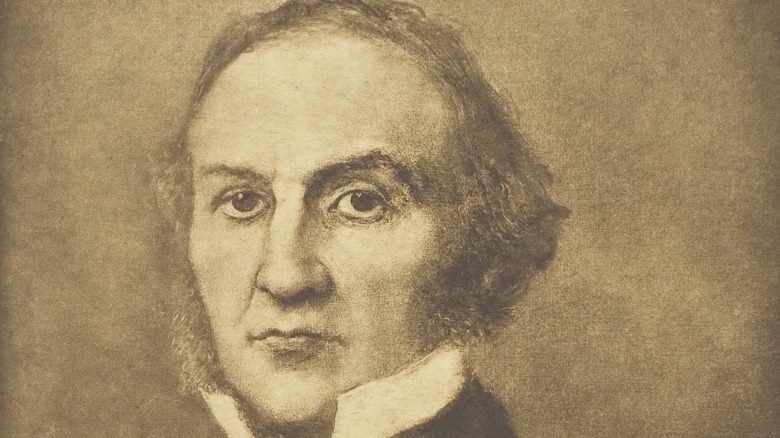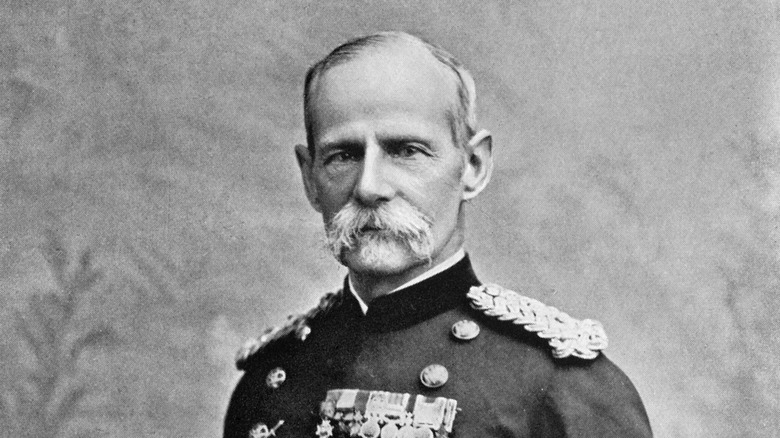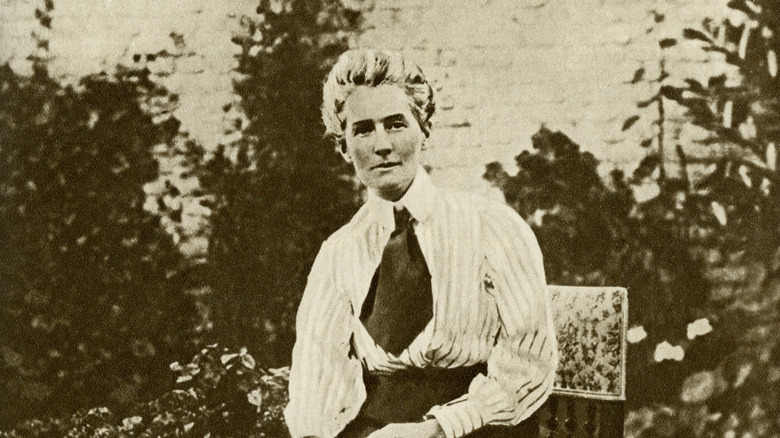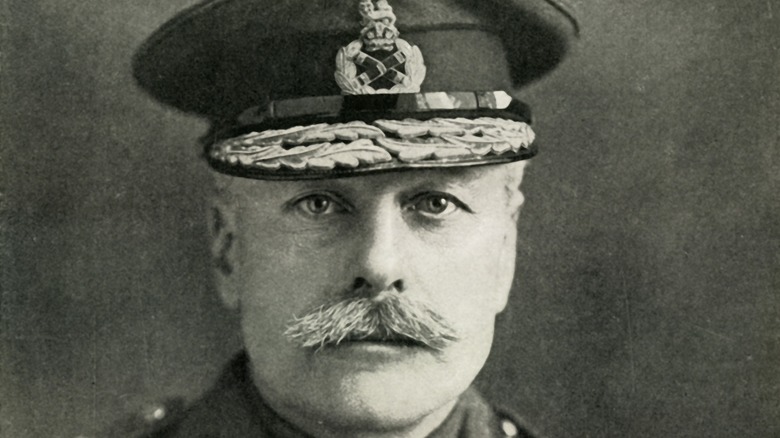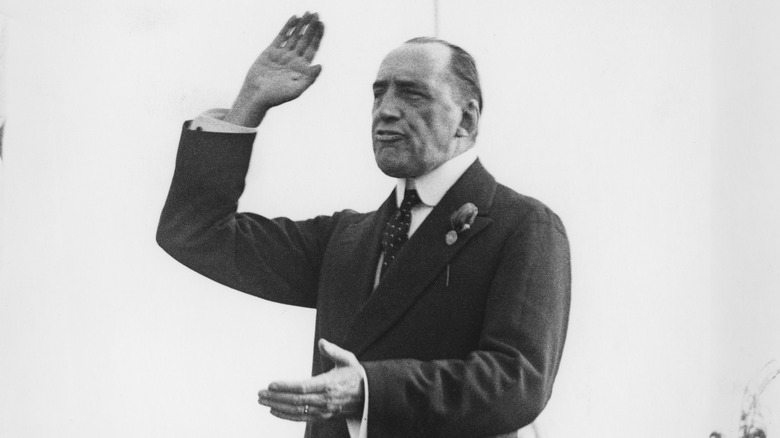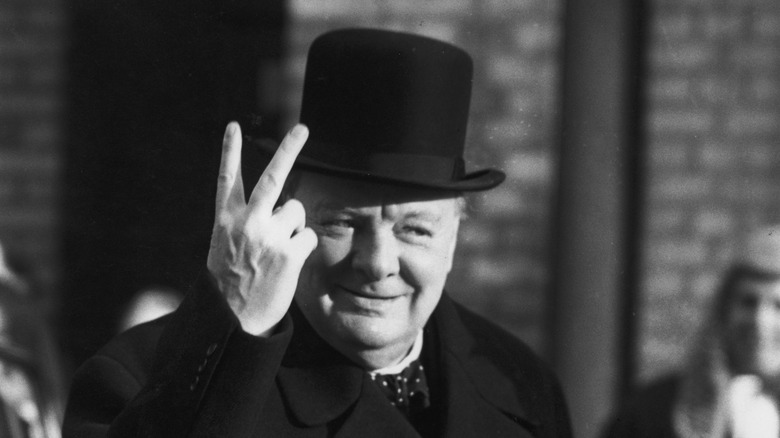The Only People Outside The British Royal Family Given State Funerals
The death of Queen Elizabeth II on September 8, 2022, was a shock to many, even though the British monarch had made it to the age of 96. While the queen had been absent from a number of public engagements during the 12 months leading up to her death, and Buckingham Palace had announced that she had been suffering from "mobility issues," the fact that she had been seen on television greeting the new British Prime Minister Liz Truss just 48 hours before her death was announced meant she had taken ill suddenly, and her death was hugely unexpected.
During the 10 days of national mourning following the queen's death, Britain's loss became the biggest news story in the world, while the queen's opulent state funeral ceremony, which took place on September 19, became one of the biggest spectacles in living memory, attracting tens of millions of viewers in the U.K. and potentially billions worldwide across various media over the course of the day.
State funerals in the U.K. are typically reserved for royalty. In recent years, state funerals have been given for Prince Philip, the queen's husband of 70 years, who died in 2021 at the age of 99, and the Queen Mother, who died at the age of 101 in 2002. However, over the course of British history, a handful of well-respected public figures not of royal descent have also been given the honor of a state funeral. Here is the full list in chronological order.
Admiral Robert Blake
Admiral Robert Blake (September 27, 1598 – August 17, 1657) was honored by a state funeral in all but name, with the highly respected naval commander given a burial fit for a king at a time when Britain didn't, in fact, have a monarch. And Blake himself was part of the reason for that.
Born into a mercantile family and educated at Oxford University, During the English Civil War, Blake became a prominent abolitionist on the side of the parliamentarians, also known as the Roundheads, who defeated the royalist Cavaliers to dismantle the monarchy and install Oliver Cromwell as Lord Protector, per Westminster Abbey.
But Blake's true accomplishments were at sea, leading the British Navy during the First Dutch war. According to the historian Michael Baumber, after Blake died from a fever in 1657, Cromwell insisted on a state funeral and that Blake's body be buried in Westminster Abbey among the graves of British kings and queens, despite Blake's own wish in life that his funeral be humble and free from ceremony. When the British Monarchy was restored half a decade later, Blake's body was exhumed from Westminster Abbey on the orders of the new king, Charles II, and reburied in the nearby St. Margaret's Church, according to the abbey's website.
Sir Isaac Newton
British scientists Sir Isaac Newton (December 25, 1642 – March 20, 1727) is best remembered today as the father of gravitational theory, with the oft-told anecdote that he discovered the force of gravity after an apple fell on his head while he was lying under a tree being told to countless generations of science students since Newton's death in 1727.
Newton was hailed as a genius in his day and is still considered one of the most original and brilliant scientific minds of all time. However, Newton's energies were not poured exclusively into the study of gravity during his 84 years on Earth. Per Britannica, Newton made striking discoveries in optics and mathematics, and even towards the end of his life, served his country as warden of the Royal Mint.
Newton was so well thought of that following his death, his body lay in state at Westminster Hall, where he was visited by numerous prominent noblemen as well as fellow scientists and colleagues from the Royal Society. He was buried at Westminster Abbey, the first scientist in history to be so, where numerous memorials commemorate him. Newton has since been joined in his final resting place by other deceased members of the British scientific community, including evolutionary theorist Charles Darwin and physicist Stephen Hawking.
Vice-Admiral Horatio Nelson
Vice-Admiral of the British Navy Horatio Nelson (September 29, 1758 – October 21, 1805) is considered by modern military history enthusiasts to be among the greatest naval commanders the country ever produced. Commander of the Royal Navy during the French Revolution and Napoleonic Wars, Nelson's strategic nous and ability to motivate those under his command will vital in maintaining British dominance of the seas around Europe.
The story of his death on the deck of the Royal Navy flagship Victory at the hands of a French sniper during the Battle of Trafalgar is legendary, with accounts of his death and the repatriation of his body back to London precipitating an enormous outpouring of grief among the British populus, who lined the banks of the river Thames to watch the admiral's barge bring his body to lie in state in Greenwich, London, according to Nelson's biographer Christopher Hibbert.
Per the same source, demand for attendance at Nelson's funeral and his burial at St. Paul's Cathedral was so high, particularly among fellow members of the British military, that the event have to be ticketed, while the funeral itself was on such a scale that many guests found themselves lost in procession and unable to find the correct horse-drawn carriages to take them to the service.
The Duke of Wellington
Equal in standing to Viscount Nelson among British military history buffs is Arthur Wellesley, 1st Duke of Wellington (May 1, 1769 – September 14, 1852), another of the exclusive group of non-royal public figures to have been given a state funeral in Britain, with his name being secured in British history for his role as military commander in the Battle of Waterloo.
Queen Victoria herself insisted that Wellington be honored with the most lavish memorial ceremony possible. Benjamin Disraeli, the Prime Minister at the time of Wellington's death, described him in parliament as "the greatest man of a great age," and endorsed a period of national mourning and states funeral for the late military leader and parliamentarian, according to the chronicler Joseph Drew.
Per British History Online, Wellington's body lay in state at Chelsea Hospital in the days prior to his funeral and burial at St. Paul's Cathedral. Demand was such as the event had to be ticketed, while in one tragic incident, several mourners were crushed when the crowds in Chelsea Hospital wishing to pay their respects became too voluminous.
Viscount Palmerston
Henry John Temple, 3rd Viscount Palmerston (October 20, 1784 – October 18, 1865), was an extremely popular Prime Minister whose aggressive imperial foreign policies cemented the dominance of the British Empire in the early 19th century.
As noted by his biographer Jasper Godwin Ridley, Palmerston Lived during a time of great change and expansion for Britain, the population of which expanded from 9 million to 25 million between Palmerston's birth and death.
Though Palmerston changed his political allegiance throughout his life, Belonging to three different political parties, he was a permanent fixture in 19th-century British politics serving for long periods as foreign minister and as prime minister twice. Palmerston was unusual in being prime minister at the time of his death, and his last words reportedly concerned foreign policy: "that's Article 98, now go onto the next," according to Ridley. Though Lord Palmerston had wanted a humble funeral, his wife, Lady Palmerston, agreed with cabinet ministers after his death that her late husband should be honored with a grand ceremony and be buried in Westminster Abbey among countless other great figures from British history.
Lord Napier of Magdala
Field Marshal Robert Cornelis Napier, 1st Baron Napier of Magdala (December 6, 1810 – January 14, 1890), was one of the most prolific military leaders of 19th-century British imperialism, and his career as an army officer took him to the farthest reaches of the British Empire.
Noted in a contemporary obituary at the time of Napier's death, the Baron was born into a military family. His father, Frederick Napier, had achieved the rank of major in the British Army, but the younger Napier would go on to enjoy an even more illustrious career, following ruthless colonial campaigns in Abyssinia — the country where Magdala of Napier's title is found — and six years' service as commander-in-chief of the British colony in India. Napier was also a celebrated engineer, and towards the end of his life both the Governor of Gibraltar and the constable of the Tower of London.
It was in the Tower of London that Napier's remains lay in state before an opulent state funeral at the behest of Queen Victoria. His loss was also mourned throughout Europe, with the Emperor of Germany releasing a statement to the British people stating: "I deeply grieve For the loss of the excellent Lord Napier of Magdala, and I hasten to express my sympathy to you and to the whole British forces."
Prime Minister William Gladstone
William Gladstone (December 29, 1809 – May 19, 1898) served four terms as British Prime Minister over the course of a 60-year parliamentary career, making him one of the most prominent British politicians of the 19th century.
According to Gladstone's biographer H.C.G. Matthew, the Liberal pioneer's career ran deep into his old age, with the parliamentarian fighting a general election in 1880 at the age of 70, and doing so again six years later to take power one last time. Indeed, Gladstone lived a public life until well into his 80s, only reducing public appearances when his health began to decline.
After Gladstone's death, his body lay in state in Westminster Hall, having arrived there by the newly built London Underground, according to Matthew. The late Prime Minister was so well thought of that members of the royal family, including the future kings Edward VII and George V, acted as pallbearers at Gladstone's funeral and burial in Westminster Abbey.
Earl Roberts of Kandahar
Field Marshal Frederick Sleigh Roberts, 1st Earl Roberts (September 30, 1832 – November 14, 1914) was yet another prominent military figure of British imperialism whose exploits in overseas campaigns establishing British colonies abroad brought him much acclaim in his homeland, where despite his ruthlessness on the battlefield he was given the cuddly nickname "Bobs," and he cultivated warm and friendly public persona, per his biographer Harold Felix Baker Wheeler.
Roberts passed away following a short illness on a visit to inspect colonial troops stationed in St. Omer, France, where his body was laid to rest for several days while arrangements were made for his repatriation. The lifelong military commander was widely mourned following the return of his body to his native Britain, with his repatriation, state funeral, and burial at St. Paul's Cathedral becoming especially significant in the eyes of the British public occurring as they did at the outbreak First World War. As noted by Wheeler, Roberts' state funeral was a military event with thousands of people lining streets to pay tribute to the famous soldier and, through him, to the British military in general.
Edith Cavell
The shocking death of the British nurse Edith Cavell (December 4, 1865 – October 12, 1915) in the early days of the First World War was one of the most seismic news stories of the period, which had enormous repercussions for both sides.
Cavell was captured by German forces while working at school in occupied Brussels, where she was found to have been assisting British and French troops to escape from German territory and get safely to Britain. According to German military law, anyone found undermining the German war effort was to be sentenced to death, and after a brief imprisonment, Cavell was executed by firing squad. After the war, her remains were returned to her home country for state burial.
Cavell's state funeral was a momentous event, and transformed the brave and respected nurse into a war martyr and icon, with Cavell's angelic response to her fate — "Patriotism is not enough. I must have no hatred or bitterness for anyone" — reproduced on her monument, according to London Remembers. Per HistoryNet, the execution of Cavell strengthened popular support for the allied war effort, damaging Germany's legitimacy and standing on the world stage.
Field Marshal Douglas Haig
Field Marshal Douglas Haig, 1st Earl Haig (June 19, 1861 – January 29, 1928) was another major figure of the First World War to receive a British state funeral. Chief of staff of the British Expeditionary Force, Haig was the architect of the battle plans for many of Britain's most decisive offensives against the German forces, most notoriously the Battle of the Somme on July 1, 1916, a brutal trench battle in which 110,000 British infantry were sent "over the top" in no man's land. Haig's strategy resulted in 60,000 British casualties and 20,000 deaths, according to HistoryNet.
Though prominent war leaders, including Sir Winston Churchill, praised Field Marshal Haig as the right man to lead the British forces during the conflict, retrospective assessments of his decision-making during the war, including his willingness to sustain enormous casualties, have seen his reputation plummet in the decades since his death. Nevertheless, Haig received a grandiose state funeral, with grief at the news of his sudden death of a heart attack being mourned across the British Empire, according to Haig's biographer, Gary Mead.
Lord Carson
Edward Henry Carson, Baron Carson (February 9, 1854 – October 22, 1935) enjoyed in his long public life illustrious careers in law and politics, and had a decisive role in the formation of the United Kingdom as it still exists today.
Per Britannica, Carson was born in Southern Ireland, known today as the Republic of Ireland, So he converted to the Unionist cause in the North, opposing the British government policy of Home Rule and maintaining the six counties of Northern Ireland as part of the Union, earning himself the nickname "the Uncrowned King of Ulster" in the process. Carson even secured weapons for a full-scale civil war with the south, though the conflict was averted with the outbreak of World War I. As well as for his Unionism, Person is remembered for his role as a barrister in Oscar Wilde's homosexuality trial, and for serving as First Lord of the Admiralty of the British Royal Navy.
Carson died in England, but his body was repatriated to Northern Ireland and where he was given the honor of a state funeral by the Northern Irish government, during which his coffin was draped in a Unionist flag, according to his biographer Anthony Terence Quincy Stewart.
Sir Winston Churchill
Though Sir Winston Leonard Spencer Churchill (November 30, 1874 – January 24, 1965) Is remembered today as a master orator whose rousing speeches and willingness to face the threat posed by Hitler's Nazi Germany during World War II and is considered among the country's greatest ever war heroes, the years following the Victory of the allied forces in 1945 were more chequered for Churchill than his reputation today might suggest.
Just months before the end of World War II, Prime Minister Winston Churchill and the Conservative Party were voted out of power in the 1945 general election, per his biographer Andrew Roberts. What followed was six humiliating years as a leader of the opposition, with the wartime prime minister only narrowly regaining the approval of the British public in 1951 and returning the Conservatives to power.
After scraping his way back into government, Churchill, now in old age and with his health failing him, was loath to relinquish power and step down, and only did so when it became obvious that those around him and his time is up. After an extended period of peace and prosperity, at the time of his death, Churchill had become a celebrated figure once again, with an estimated 320,000 people coming to pay their respects, and he lay in state in Westminster Hall, according to Roberts. He was later buried at St. Paul's Cathedral, which had miraculously survived the impact of 28 bombs during the war through which Churchill had led Britain to victory.
